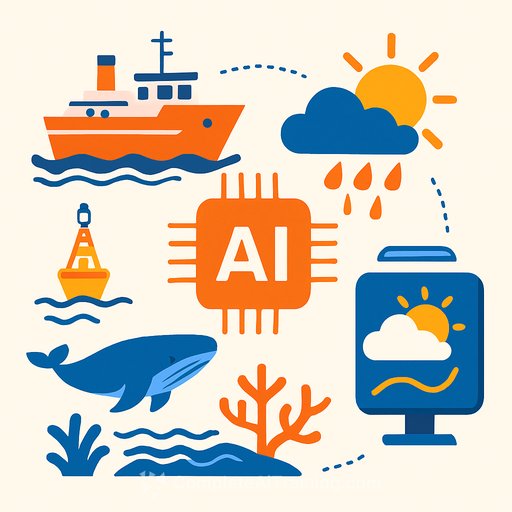Green Cleaner Tech AI Accelerates Climate Research from Ocean Depths to Weather Forecasts
Artificial intelligence is providing a crucial boost to climate research amid increasing extreme weather events and budget cuts affecting science globally. Despite concerns over the significant energy consumption involved in training advanced AI models, the technology offers promising advances for scientific progress.
Ángel Borja, a biologist at AZTI marine research center in Spain, describes AI as “a gigantic step forward.” It enables rapid data processing and faster results, empowering decision-makers to act promptly. Researchers are adapting existing AI models and developing new ones to handle routine but time-consuming tasks that once required weeks or months of human effort. Now, data collected from remote ocean floors to Antarctica can be analyzed within hours.
While AI brings clear benefits, some scientists urge caution. Jonathan Foley, executive director of Project Drawdown, highlights that machine learning tools should complement, not replace, human judgment and analysis. His organization limits AI use to basic tasks like grammar checks, document formatting, and gathering scattered information because generative AI can inadvertently produce fabricated or plagiarized content. Nonetheless, many researchers are moving forward with AI applications. Below are three practical examples.
AI Accelerates Marine Research and Policy Support
Borja recalls spending extensive time manually collecting and entering data early in his career. Computers and the internet improved efficiency, but recent AI developments have brought a new level of transformation. Contrary to fears of job loss, AI is handling routine data tasks, freeing researchers to focus on interpreting results.
At AZTI, AI is enhancing the center’s ability to inform policymakers on issues like fishing quotas and marine protected areas. Millions of data points collected over 30 years—including water quality and species presence—are fed into AI models that summarize the database contents and structures. This helps scientists quickly identify relevant datasets for their studies.
Another AI model is trained with underwater videos and images to recognize different fish and marine species. Previously, scientists had to watch hundreds of hours of footage to manually catalog species, locations, and abundances. AI now delivers faster insights into marine ecosystem health, with wider AI adoption expected in scientific fields within five years.
Improved Weather Forecasting through AI
AI-powered forecasting models are surpassing traditional systems in accuracy. Microsoft’s Aurora, trained on over a million hours of geophysical data, outperformed both the European Centre for Medium-Range Weather Forecasts and Google DeepMind’s GraphCast in 91% of tested scenarios. Aurora predicts air quality, wave patterns, and tropical cyclone paths while using a fraction of the computational resources required by conventional models.
Such AI models enable climate scientists to explore vastly more scenarios, uncovering insights at scale. However, AI’s opaque “black box” nature raises some concerns among forecasters. Still, improved weather predictions provide vital early warnings, helping communities prepare for severe events.
Supporting Citizen Science with AI Assistance
Combining human input with AI yields effective scientific outcomes, as shown in a 2023 paper in Citizen Science: Theory and Practice. Nirwan Sharma from The Open University began using natural language generation (an early form of generative AI) in 2010 for a citizen science project involving bumblebee identification in the UK.
Participants sent photos of bumblebees, which AI identified among 22 species before researchers verified the results. Initially, about 10 people were needed to accurately identify species, but as the AI improved, only three people were required. The project later extended to plant identification, enabling tailored planting suggestions to attract specific bee species.
Sharma emphasizes that AI helps unlock scientific knowledge often locked in journals or hard-to-access sources, facilitating a dialogue between people and research data.
AI's practical applications in climate science—from marine research to weather prediction and citizen contributions—are accelerating progress and enabling faster, better-informed decisions. For those interested in expanding AI skills in research or other fields, exploring targeted courses can provide valuable expertise. Check out Complete AI Training’s job-specific courses for practical learning paths.
Your membership also unlocks:






